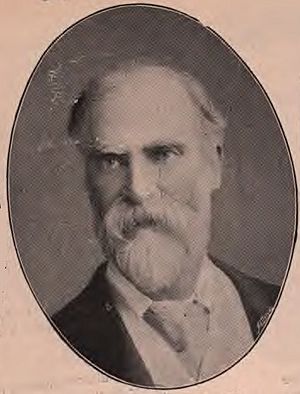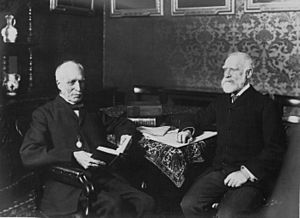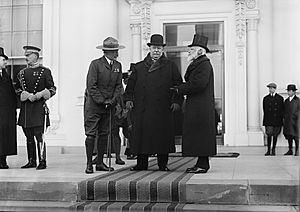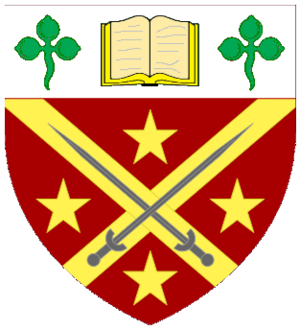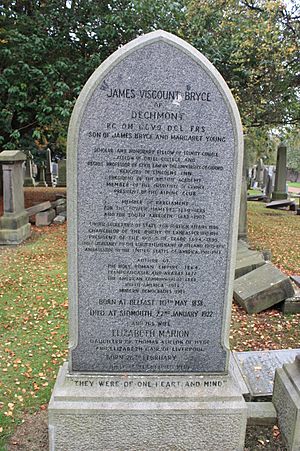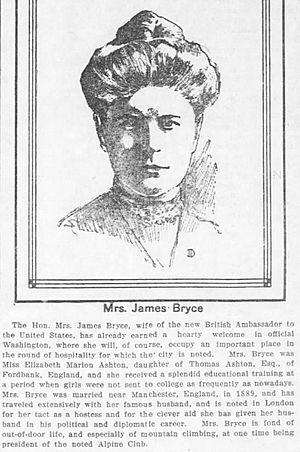James Bryce, 1st Viscount Bryce facts for kids
Quick facts for kids
The Viscount Bryce
|
|
|---|---|
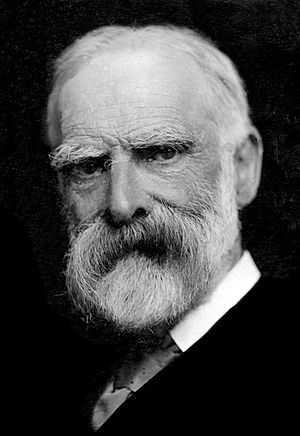
Bryce in 1902
|
|
| British Ambassador to the United States | |
| In office 1907–1913 |
|
| Monarch | Edward VII George V |
| Prime Minister | Sir Henry Campbell-Bannerman H. H. Asquith |
| Preceded by | Sir Henry Mortimer Durand |
| Succeeded by | Sir Cecil Spring Rice |
| Chief Secretary for Ireland | |
| In office 10 December 1905 – 23 January 1907 |
|
| Monarch | Edward VII |
| Prime Minister | Sir Henry Campbell-Bannerman |
| Preceded by | Walter Long |
| Succeeded by | Augustine Birrell |
| President of the Board of Trade | |
| In office 28 May 1894 – 21 June 1895 |
|
| Monarch | Victoria |
| Prime Minister | The Earl of Rosebery |
| Preceded by | A. J. Mundella |
| Succeeded by | Charles Thomson Ritchie |
| Chancellor of the Duchy of Lancaster | |
| In office 18 August 1892 – 28 May 1894 |
|
| Monarch | Victoria |
| Prime Minister | William Ewart Gladstone |
| Preceded by | The Duke of Rutland |
| Succeeded by | The Lord Tweedmouth |
| Under-Secretary of State for Foreign Affairs | |
| In office 7 February 1886 – 20 July 1886 |
|
| Monarch | Victoria |
| Prime Minister | Gladstone |
| Preceded by | Hon. Robert Bourke |
| Succeeded by | Sir James Fergusson, Bt |
| Personal details | |
| Born | 10 May 1838 Belfast, Ireland |
| Died | 22 January 1922 (aged 83) Sidmouth, Devon, South West England |
| Political party | Liberal |
| Alma mater | University of Glasgow, University of Oxford |
| Occupation | Politician |
| Profession | Academic |
| Signature | |
James Bryce, 1st Viscount Bryce (born May 10, 1838 – died January 22, 1922) was a very important British person. He was a smart academic, a lawyer, a historian, and a politician from the Liberal Party. He traveled a lot and knew a great deal about law, government, and history.
His knowledge helped him get high political jobs. He was especially successful as the British Ambassador to the United States from 1907 to 1913. One of his most famous works was The American Commonwealth (1888). This book was a deep look into American politics. It helped people in Britain and the U.S. understand America better.
Contents
- Early Life and Education
- Bryce's Academic Career
- Bryce as a Member of Parliament
- The American Commonwealth (1888)
- Ambassador to the United States
- Becoming a Viscount
- First World War and Human Rights
- Bryce's Beliefs and Legacy
- Honors and Public Roles
- Personal Life and Family
- Memorials and Tributes
- Famous Sayings
Early Life and Education
James Bryce was born in Belfast, Ireland. His father was also named James Bryce. For his first eight years, James lived at his grandfather's house near Whiteabbey. He often played by the peaceful shoreline. His younger brother was Annan Bryce.
James went to school at the Belfast Academy and Glasgow High School. He then studied at the University of Glasgow, the University of Heidelberg in Germany, and Trinity College, Oxford in England.
In 1862, he became a fellow at Oriel College, Oxford. In 1867, he became a lawyer. His time studying in Germany made him admire German history and law. He believed in "Teutonic freedom," a concept that he felt connected Germany, Britain, and the United States. He thought these three countries were "natural friends."
Bryce's Academic Career
Bryce worked as a lawyer in London for a few years. But soon, he returned to Oxford. He became a professor of Civil Law there in 1870. He held this important job until 1893. From 1870 to 1875, he also taught law at Owens College, Manchester. He was already known as a historian for his book on the Holy Roman Empire, which he wrote in 1864.
In 1872, Bryce traveled to Iceland. He wanted to see the places from the old Icelandic sagas, especially Njáls saga, which he loved. In 1876, he went on an adventure through Russia to Mount Ararat. He climbed high up the mountain. There, he found a piece of hand-cut wood, about 4 feet long and 5 inches thick. He thought it could be from Noah's Ark, as believed by the Armenian Apostolic Church. He did not offer other ideas for what it might be.
Bryce also supported better education for everyone, especially women. In 1872, he joined a group called the National Union for Improving the Education of Women of All Classes.
Bryce as a Member of Parliament
In 1880, James Bryce became a Member of Parliament (MP). He was a strong member of the Liberal Party. He represented Tower Hamlets in London. In 1885, he was elected for South Aberdeen. He kept this seat until 1907.
Bryce was very smart and worked hard. This made him a valuable member of the Liberal Party. In the late 1860s, he led a group looking into secondary education. In 1885, he became the Under-Secretary of State for Foreign Affairs. This was under Prime Minister William Ewart Gladstone. However, the Liberals lost the election that year, and Bryce left office.
In 1892, he joined Gladstone's last government. He became the Chancellor of the Duchy of Lancaster. At the same time, he joined the Privy Council, a group of important advisors to the monarch.
In 1894, Bryce was made President of the Board of Trade in the new government led by Lord Rosebery. But the Liberal government fell the next year. They were out of power for ten years.
After visiting South Africa in 1897, Bryce wrote a book called Impressions. This book was very important for Liberals when they discussed the Second Boer War. He wrote about South Africa's history, economy, and his travels there.
In 1905, Bryce became the Chief Secretary for Ireland. This was under Prime Minister Sir Henry Campbell-Bannerman. He stayed in this job through 1906. Bryce had some concerns about new social reforms proposed by his own Liberal government. These included old-age pensions and certain financial policies.
The American Commonwealth (1888)
Bryce became very well known in America because of his book The American Commonwealth (1888). This book was a detailed study of how the United States government and its systems worked. He wrote it from the view of a historian and a lawyer who understood constitutions.
Bryce carefully followed the travels of Alexis de Tocqueville. Tocqueville had written Democracy in America much earlier. Tocqueville had noted how equal American society seemed in the early 1800s. But Bryce was surprised to find a lot of inequality. He wrote that "Sixty years ago, there were no great fortunes in America... Now there is some poverty... and a greater number of gigantic fortunes than in any other country of the world."
He also noted changes in education. He said that while many elementary schools helped most people, there was a growing group who went to the best universities. He felt that equality in this area had decreased. His book was widely used in universities. It also helped American writers who wanted to show American history as being uniquely Anglo-Saxon.
Ambassador to the United States
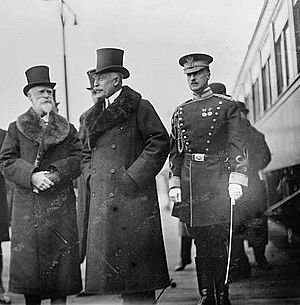
In February 1907, Bryce was chosen to be the British Ambassador to the United States. He held this important job until 1913. He was very good at making the relationship between Britain and America stronger and friendlier. He made many personal friends among American politicians, including President Theodore Roosevelt.
The German ambassador in Washington, Graf Heinrich von Bernstorff, later said he was glad Bryce was not his rival during the First World War. This was because Bryce was so good at gaining American support.
Becoming a Viscount
In 1914, after he retired as Ambassador and returned to Britain, Bryce was given a special title. He became Viscount Bryce, of Dechmount. This meant he became a member of the House of Lords. The House of Lords is part of the British Parliament. Its powers had been reduced by a law in 1911.
First World War and Human Rights
When the First World War started, Prime Minister H. H. Asquith asked Bryce to write a report. This report, known as The Bryce Report, described terrible acts by German soldiers in Belgium. The report was published in 1915. It strongly criticized Germany's actions against civilians. An American director, Vernon Lyman Kellogg, confirmed Bryce's report. He told the New York Times that German soldiers had forced many Belgians into slavery and hurt them.
Bryce also strongly spoke out against the Armenian genocide in the Ottoman Empire in 1915. He was the first person to talk about this in the House of Lords in July 1915. Later, with help from historian Arnold J. Toynbee, he created a detailed record of the killings. This was published as a Blue Book by the British government in 1916. In 1921, Bryce wrote that the Armenian genocide had also killed half of the Assyrians in the Ottoman Empire. He noted similar cruelties against them.
Bryce's Beliefs and Legacy
Bryce was cautious about some modern democratic ideas, as seen in his book Modern Democracy (1921). However, he was a strong supporter of international organizations. In his later years, Bryce worked as a judge at the International Court in The Hague. He also helped to promote the creation of the League of Nations. This was an organization meant to prevent future wars.
Honors and Public Roles
James Bryce received many awards from universities in Britain and other countries. In 1901, he received a Doctor of Laws degree from Dartmouth College. In 1902, he received an honorary degree from the University of St Andrews.
He became a member of the Royal Society in 1894. This is a very old and respected group for scientists.
When he was younger, Bryce was a famous mountain climber. He climbed Mount Ararat in 1876. He wrote a book about his travels in Transcaucasia and Ararat in 1877. From 1899 to 1901, he was the president of the Alpine Club, a group for mountain climbers. His journey to the Caucasus region made him distrust the rule of the Ottoman Empire in Asia Minor. It also made him feel great sympathy for the Armenian people.
In 1882, Bryce started the National Liberal Club. Many important Liberal politicians were members, including Prime Minister William Ewart Gladstone, David Lloyd George, and Winston Churchill. In April 1882, Bryce became a member of the American Antiquarian Society.
In 1907, King Edward VII made him a Member of the Order of Merit. This is a very special award. When the King died, Bryce organized a memorial service for him in Washington. At Bryce's own memorial service, King George V sent his condolences. He said he saw Lord Bryce as an "old friend and trusted counsellor." Queen Victoria had once said that Bryce was "one of the best informed men on all subjects I have ever met."
Bryce was president of the American Political Science Association from 1907 to 1908. He was also president of the British Academy from 1913 to 1917. In 1919, he gave an important lecture on "World History."
From 1917 to 1918, Bryce led a group called the Conference on the Reform of the Second Chamber. This group looked at how to change the House of Lords.
Personal Life and Family
In 1889, Bryce married Elizabeth Marion Ashton. She was the sister of Thomas Ashton, 1st Baron Ashton of Hyde. Lord and Lady Bryce did not have any children.
James Bryce died on January 22, 1922, at the age of 83. He passed away in Sidmouth, Devon, while on one of his many travels. Since he had no children, his title of Viscount ended with him. His body was cremated.
Lady Bryce is mentioned in the memories of Captain Peter Middleton. He was the grandfather of Catherine, Duchess of Cambridge. He wrote that he was scared of Lady Bryce.
Lady Bryce died in 1939. Her personal papers are kept at the Bodleian Library.
Memorials and Tributes
There is a large monument to Viscount Bryce in Grange Cemetery in Edinburgh. It is believed his ashes are buried there.
A statue of Viscount Bryce can be found in Trinity Church in New York City. Another similar statue is in the U.S. Capitol Building. There is also a park named Bryce Park in Washington D.C.
In 1965, the James Bryce Chair of Government was created at the University of Glasgow. This was an important teaching position. In 1970, the name was changed to "Politics."
In 2013, the Ulster History Circle placed a blue plaque for him in Belfast. This was near where he was born.
In 1998, a small street in Yerevan, Armenia, was named "James Bryce Street." This was to celebrate 160 years since his birth.
Famous Sayings
- "Patriotism means not just waving the flag. It means working to make our country good and strong."
- "No government asks as much from its citizens as a democracy. And none gives back as much."
- "Life is too short to read bad books."
- "Getting too angry about human foolishness is actually a very foolish thing itself."


